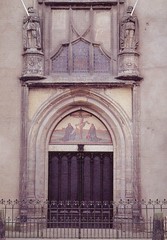 Image by Mikey G Ottawa via Flickr
Image by Mikey G Ottawa via Flickr
Critics of the Reformation often complain about the multitude of denominations it spawned. Certainly the Bible talks mostly of one church (although this is less starkly clear as we often read in the Bible of churches linked to the place they meet). So it gave me a moment of head scratching to read this from Luther on Galatians 5:15:
By these words Paul meaneth, that if the foundation, that is, faith in Christ be overthrown by false teachers, no peace or concord can remain in the Church, either in doctrine or life ; but there must needs be divers opinions and dissensions from time to time, both in doctrine and life, whereby it cometh to pass that one biteth and devoureth another, that is to say, one judgeth and condemneth another, until at length they be consumed. Hereof not only the Scripture, but also the examples of all times bear witness. When the church of Africa was perverted by the Manichees, by-and-by followed the Donatists, who also disagreeing among themselves were divided into three sects. And where is that Church to-day? At this day how many sects are springing up one after another? Thus when the unity of the spirit is broken, it is impossible that there should be any concord either in doctrine or life, but daily new errors arise without measure and without end. Paul therefore showeth how such discord may be avoided. Let every man do his duty in that state of life to which God hath called him.I wondered what Luther was talking about. Was he looking forward and seeing that the Reformation he began was going to cause splits in the church? Was he already seeing many sects in his break away movement? My commentary has no annotations so I am left on my own to puzzle things out for myself. So I placed a post-it on the spot and continued on in my readings.
Some pages later I came to what I believe was Luther's meaning for this splitting that he describes.
Heresies, or sects, have always been in the Church, as we have said before. Notwithstanding the pope is an arch- heretic, and the head of all heretics; for he hath filled the world, as it were, with a huge flood of infinite sects and errors. What concord and unity was there in so great diversity of the monks, and various religious orders. No one sort of them, or sect, could agree with another; for they measured their holiness by the strictness of their rule. Hereof it cometh that the Carthusian will needs be counted holier than the Franciscan, and so likewise the rest. Wherefore there is no unity of spirit, nor concord of minds, but great discord in the papistical church. Contrariwise among the Christians, the word, faith, sacraments, service, Christ, God, heart, soul, mind, and understanding, are all one and common to all.
So unexpectedly (at least to me) he sees division and sects in the Roman Catholic Church of his own day. This is unexpected to my modern mind which looks back and sees the Roman Catholic Church prior to the Reformation as a monolith (well mostly). It is also unexpected to note that he sees it with so much diversity in it and not under one head. I also see the Roman Catholic Church of today as more orderly with a single head who rules all in his church. It seems Luther saw something else in his time.
![Reblog this post [with Zemanta]](http://img.zemanta.com/reblog_a.png?x-id=4d561b2a-aa56-4078-9c29-f15327c7f714)



0 comments:
Post a Comment